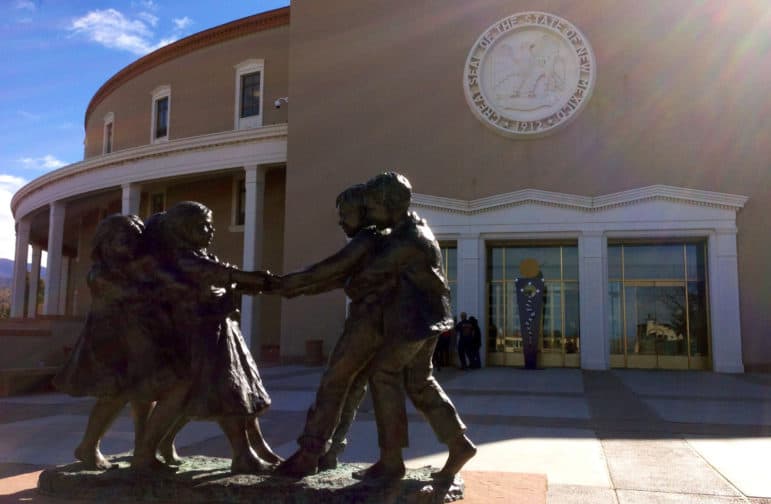
Heath Haussamen / NMPolitics.net
A statue outside the Roundhouse in Santa Fe.
The state Senate voted Wednesday to require more transparency about the political spending of so-called dark money groups while also doubling the amount of money individuals can donate to candidates for public office.
Senate Bill 96 has won backing from campaign finance reform advocates who have pushed for years to close loopholes that allow groups to spend large sums of money to influence elections without having to disclose their donors. But a section that would allow candidates to raise far more money from private individuals prompted one Democrat to split with his party and oppose the proposal altogether.
“People want money out of politics,” said Sen. Jeff Steinborn, D-Las Cruces. “Growing our individual contribution limits is the wrong direction.”
Under the bill, the cap on donations from an individual to a candidate running for certain posts, such as a seat in the Legislature or on a county commission, would jump to $10,000 from $5,000.
The $10,000 cap on donations from political action committees to individuals would remain in place, and the amount of money individuals could give a candidate for statewide office, such as governor or attorney general, each election season would fall to $10,000 from $11,000.
Steinborn believes the law could have the effect of allowing public officials serving four-year terms, such as state senators or a governor, to double their fundraising from individuals and political action committees by resetting the contribution limits every two years after each election — even after the election in which they are not on the ballot.
Steinborn, who said he supports much of the bill and sponsored legislation in 2009 to establish campaign finance limits, was the only Democrat to vote against it. The bill passed the Senate 36-6.
Campaign finance reform advocates argue the bill still holds the best hope for bringing transparency to the burgeoning world of political action committees and independent expenditure groups.
Viki Harrison, executive director of Common Cause New Mexico, said the organization does not want to support raising limits on campaign contribution limits, but she said the bill would represent a big advance toward curbing the influence of money in state politics.
SB 96, for example, would require greater transparency in the political spending of “dark money” groups — nonprofit organizations financed by individuals, trade associations, unions and advocacy groups that can spend virtually unlimited sums of money to support or oppose candidates without having to disclose information about donors.
The bill would require any such group that spends more than $1,000 campaigning during an election cycle to report expenditures and provide information about certain contributors.
And any such group that coordinates with a candidate would be subject to contribution limits.
The bill’s concepts are hardly new for the Legislature.
Its sponsor, Senate Majority Leader Peter Wirth, D-Santa Fe, has filed similar bills each year since 2011, partly in response to a series of court rulings he argues has left New Mexico’s existing campaign finance laws largely unenforceable.
Wirth’s proposals have passed the Senate on four occasions but died each time in the state House of Representatives.
But with a new secretary of state in office after last year’s election, the Legislature may not be necessary for at least a few campaign finance reforms.
Maggie Toulouse Oliver, a Democrat, campaigned on reining in the influence of money in state politics. And Wirth told the Senate on Wednesday that if his latest bill fails, Toulouse Oliver may undertake some reforms on her own through regulatory power.
“If we don’t get this bill,” he said, “they have to get something to enforce.”
Contact Andrew Oxford at (505) 986-3093 or aoxford@sfnewmexican.com. Follow him on Twitter @andrewboxford.